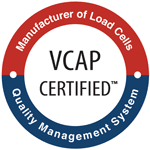 December 13, 2023
December 13, 2023
The importance of certified load cells in legal-for-trade weighing is a concern that spreads across many industries, from law enforcement to commercial transactions.
They are immensely valuable to various industries because they do more than just ensure measurement accuracy; they also uphold legal standards in weighing processes.
This adherence to regulatory requirements guarantees fairness and consistency in trade activities, essential for maintaining business integrity.
Keep reading to understand the mechanisms, certifications, and adherence to specific regulations governing legal-for-trade weighing that are out there, which you need to be aware of.
How Does a Load Cell Work?
Load cells, integral to various weighing systems, operate on a principle that involves converting mechanical force or weight into an electrical signal.
These devices consist of strain gauges that deform when subjected to force, causing a change in electrical resistance. This alteration generates an electrical signal proportional to the applied force, facilitating precise weight measurement.
Typically constructed from durable materials like alloy steel, stainless steel, or aluminum, load cells come in various types, including strain gauge, hydraulic, pneumatic, and capacitive. Each type operates uniquely but follows the fundamental principle of transforming force into an electrical signal for accurate weight determination.
What is Legal-for-Trade Weighing?
Legal-for-trade weighing refers to the standardized and regulated process of weighing goods or commodities for commercial transactions while complying with established governmental standards and regulations.
These standards exist to ensure that commercial transactions are fair, consistent, and accurately conducted.
In essence, legal-for-trade weighing involves utilizing certified weighing equipment that adheres to specific accuracy and calibration standards set by regulatory authorities.
This certification ensures that the weighing instruments used in commercial transactions are dependable and will provide accurate measurements to facilitate fair trade and protect both consumers and businesses from potential discrepancies.
Industries such as manufacturing, agriculture, logistics, and retail heavily rely on legal-for-trade weighing to conduct transactions based on precise weight measurements.
If this is your case, using certified load cells within weighing systems is essential in order to meet these legal standards and ensure compliance with trade regulations.
Where Legal-for-Trade Scales Are Used?
These are the main sectors/industries where Legal-for-trade scales are used:
Retail and Commercial Settings
These scales are employed in supermarkets, grocery stores, and markets to accurately measure products sold by weight accurately, ensuring fair pricing for consumers.
Logistics and Shipping
Airports, warehouses, and distribution centers weigh packages accurately, ensuring compliance with transportation regulations and precise invoicing.
Manufacturing and Production
Legal-for-trade scales aid in quality control by accurately measuring manufacturing facilities’ raw materials, components, and finished products.
Agriculture and Farming
To weigh produce, livestock, and agricultural products, facilitating fair trade practices.
Healthcare and Pharmaceuticals
Imagine a world where medication is delivered to your pharmacy in the wrong dosage. This is why legal-for-trade scales are essential in laboratories, pharmacies, and healthcare facilities to ensure accurate dosages and measurements are delivered without complications.
Waste Management and Recycling
In waste management and recycling, these scales accurately measure recyclable materials and waste quantities, aiding in proper disposal and recycling processes.
Mining and Resource Extraction
Industries involved in mining use these scales to measure extracted materials precisely, aiding in trading and selling resources.
Legal-for-trade scales, paired with their certified load cells, are essential tools across various sectors. They deliver precision, compliance, and fairness in commercial transactions whenever accurate weight measurements are necessary.
What is Load Cell Verification?
A load cell verification consists of a series of tests and assessments conducted to make sure that the load cells maintain their specified accuracy and meet the necessary standards set by regulatory institutions.
During the verification, the devices endure meticulous testing to validate their functionality across various weight ranges and environmental conditions.
This process includes assessing the load cell’s sensitivity, linearity, repeatability, and hysteresis to guarantee consistent and dependable performance in capturing and converting applied forces into electrical signals.
Verification also involves comparing the load cell’s output against calibrated reference weights or standards to confirm accuracy within specified tolerances.
What is an Approved Load Cell?
A load cell approved by one or more of the benchmarks and standards that regulate and foster trust in commercial transactions is considered an Approved Load Cell.
This is the list of items that are verified on load cells for weighing in order to get their approval as legal-for-trade:
Certification Marks
Approved load cells must display specific certification markings denoting compliance with relevant standards or regulatory bodies. Examples include the US NTEP (National Type Evaluation Program) certification in US and Canada, and the OIML Certification System in Europe or for international standards.
Measurement Traceability
Load cells should exhibit traceability to recognized standards, ensuring calibration and measurements can be traced back to certified references.
Calibration and Accuracy Standards
Legal-for-trade load cells must undergo precise calibration to ensure accuracy within specified tolerances. Compliance with recognized accuracy standards, such as OIML R60 (International Organization of Legal Metrology) or ASTM International standards, is imperative to meet required accuracy levels.
Traceability to Standards
Load cells should demonstrate traceability to established and certified references, ensuring that calibration, measurements, and readings are traceable and accountable.
Rigorous Testing and Validation
Approved load cells undergo rigorous testing, validation, and certification processes to verify their performance, reliability, and adherence to stringent quality standards set by regulatory bodies or industry-specific organizations.
Documentation and Compliance Records
Manufacturers or suppliers of approved load cells must provide comprehensive documentation verifying compliance with legal-for-trade regulations. This documentation includes certification records, test reports, and compliance statements.
Recognized Manufacturer or Supplier
Approved load cells should originate from reputable manufacturers or suppliers known for producing quality load cells meeting legal-for-trade standards and regulatory requirements.
Meeting these requirements is what will determine if a load cell is suited for legal-for-trade applications or not.
What Makes a Load Cell Legal-for-Trade Weighing in the United States?
For a load cell to achieve legal-for-trade status in the United States, it must adhere to stringent standards established by regulatory bodies.
Various certifications and details ensure compliance with these standards:
NTEP Certification (National Type Evaluation Program):
Load cells intended for trade purposes in the US often require NTEP certification. Governed by the National Institute of Standards and Technology (NIST), the NTEP certification ensures that load cells meet accuracy, reliability, and performance standards specified for commercial weighing applications within the United States.
Another critical factor is that for manufacturers to produce NTEP-approved load cells, they must possess an externally certified Quality Management System meeting the criteria of the Verified Conformance Assessment Program (VCAP) by the National Conference of Weights and Measures (USA).
Notably, Massload stands as the sole VCAP-certified load cell manufacturer in Canada.
What Makes a Load Cell Legal-For-Trade Weighing in Canada?
For a load cell to be deemed legal-for-trade in Canada, it must meet stringent standards set forth by Measurement Canada, adhering to specific certifications and requirements mandated by regulatory bodies. Several key certifications and details ensure the load cell’s compliance.
Measurement Canada Certification
The Measurement Canada Certification does not specifically measure load cells but rather assesses the entire weighing device.
Nonetheless, it mandates that weighing devices that utilize load cells are certified by NTEP Certification (National Type Evaluation Program).
International Certification
Beyond the national certifications, load cells for weighing can also achieve certifications based on international parameters, such as:
OIML R60 Certification
Load cells might also comply with international standards, such as the OIML R60 certification. This certification relates to global standards established by the International Organization of Legal Metrology (OIML), ensuring the load cells meet international accuracy and reliability requirements.
ASTM International Standards
Load cells might adhere to ASTM (American Society for Testing and Materials) International standards, particularly ASTM E74-18, ensuring accuracy and reliability in measurements.
Without certified load cells in legal-for-trade weighing, the conduction business would be significantly more challenging.
Moreover, having equipment with certified load cells can serve as a testament to a company’s commitment to maintaining standards and being fair on its commercial exchanges.
Whether in Canada, the United States, or internationally, adherence to certification marks attests to the load cell’s reliability, accuracy, and conformity with established legal metrology standards.
Ensure Precision with Massload’s Certified Load Cells
For precision and reliability, Massload is a leading Canadian manufacturing company specializing in quality weighing solutions.
Ensure your legal-for-trade weighing processes meet the highest standards by choosing Massload’s certified load cells.
Contact our team today to discuss your weighing needs!


